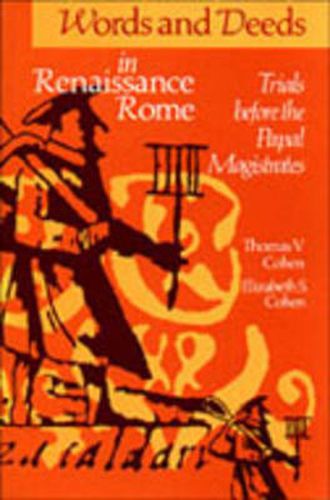Readings Newsletter
Become a Readings Member to make your shopping experience even easier.
Sign in or sign up for free!
You’re not far away from qualifying for FREE standard shipping within Australia
You’ve qualified for FREE standard shipping within Australia
The cart is loading…






The social historian, searching for the basis of a culture, often turns to a study of ordinary people. Perhaps one of the most revealing places to find them is in a court of law. In this presentatoin of nine criminal trials of sixteenth-century Rome (1540-75), where magistrates kept verbatim records, Thomas and Elizabeth Cohen paint a lively portrait of a society, one that is reminiscent of Boccaccio. These stories, however, are true. Each trial transcript is followed by an essay that interprets the beliefs, codes, everyday speech, and personal transactions of a world that is radically different from our own. The people on trial include assassins, a spell-caster, an exorcist, an adulterous wife, several courtesans, and the peasant cast of a bawdy, sacrilegious play. Out of their often pognant troubles, and their machinations, comes a vivid revelation of not only the tumultuous street life of Rome but also rituals of honour, the power and weakness of women, and the realities of social and economic hierarchies. Like cinema-verite, Words and Deeds in Renaissance Rome gives us an intimate glimpse of a people and their world.
$9.00 standard shipping within Australia
FREE standard shipping within Australia for orders over $100.00
Express & International shipping calculated at checkout
The social historian, searching for the basis of a culture, often turns to a study of ordinary people. Perhaps one of the most revealing places to find them is in a court of law. In this presentatoin of nine criminal trials of sixteenth-century Rome (1540-75), where magistrates kept verbatim records, Thomas and Elizabeth Cohen paint a lively portrait of a society, one that is reminiscent of Boccaccio. These stories, however, are true. Each trial transcript is followed by an essay that interprets the beliefs, codes, everyday speech, and personal transactions of a world that is radically different from our own. The people on trial include assassins, a spell-caster, an exorcist, an adulterous wife, several courtesans, and the peasant cast of a bawdy, sacrilegious play. Out of their often pognant troubles, and their machinations, comes a vivid revelation of not only the tumultuous street life of Rome but also rituals of honour, the power and weakness of women, and the realities of social and economic hierarchies. Like cinema-verite, Words and Deeds in Renaissance Rome gives us an intimate glimpse of a people and their world.